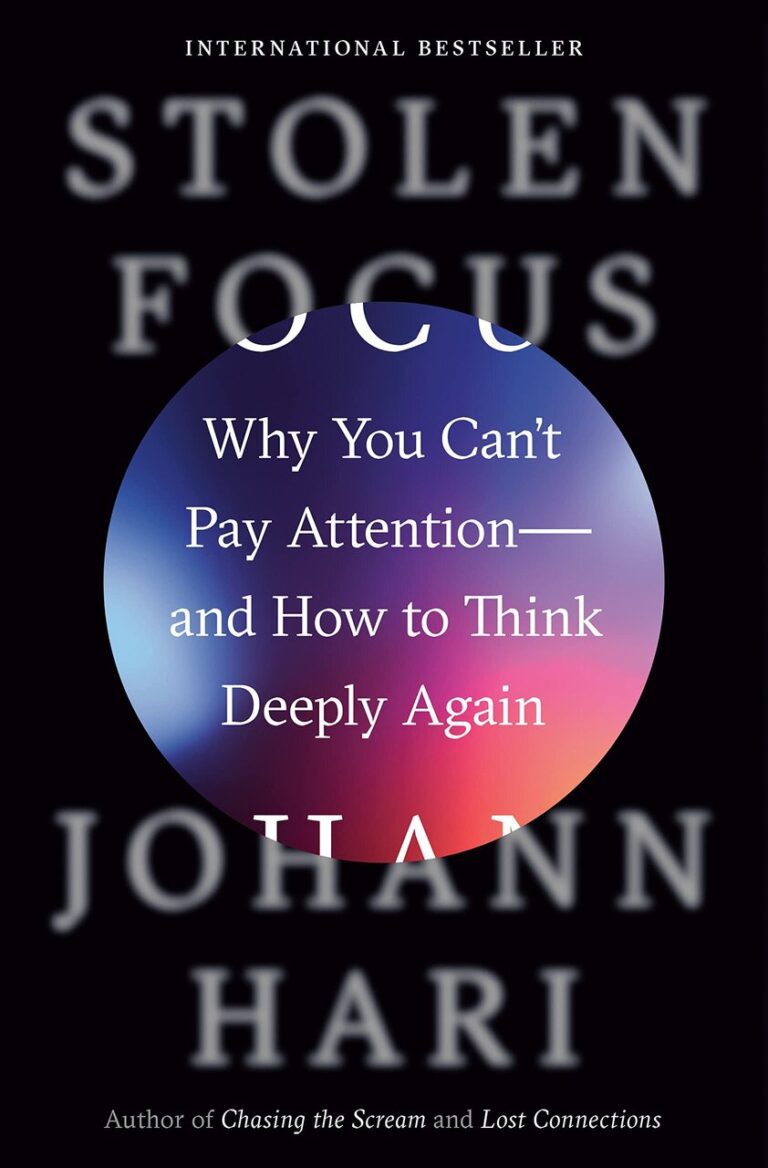In Stolen Focus: Why You Can’t Pay Attention–and How to Think Deeply Again, British-Swiss writer and journalist, Johann Hari write about our rising inability to pay attention to what really matters. With the advent of social media and other distracting media, staying focused on one particular task is getting harder by the day. Hari interviewed various scientists, thought leaders and experts in the field of technology, and neuroscience to discover the cause, effects and solutions to our stolen focus.
“As human beings get older, they can focus less, and they become convinced that this is a problem with the world and with the next generation, rather than with their own failing minds.”
Stolen Focus Stats
- The average office worker now spends 40 percent of their work time wrongly believing they are “multitasking”—which means they are incurring all these costs for their attention and focus.”
- One study found that most of us working in offices never get a whole hour uninterrupted in a normal day.
- The average CEO of a Fortune 500 company, for example, gets just twenty-eight uninterrupted minutes a day.
- The average teen and young adult genuinely believes they can follow six or seven forms of media at once. (Dr. Larry Rosen, a professor of psychology at California State University)
- Nine million Americans—4 percent of adults—are using prescription sleeping pills, and vastly more are using over-the-counter sleep aids.
- 90 percent of Americans look at a glowing electronic device in the hour before they go to bed. We are now exposed to ten times the amount of artificial light that people were exposed to just fifty years ago.
- The average child between the ages of thirteen and seventeen in the U.S. was sending one text message every six minutes they were awake.
- In April 2020, the average citizen spent thirteen hours a day looking at a screen. The number of children looking at screens for more than six hours a day increased sixfold, and traffic to kids’ apps trebled.
A life full of distractions is, at an individual level, diminished. When you are unable to pay sustained attention, you can’t achieve the things you want to achieve. You want to read a book, but you are pulled away by the pings and paranoias of social media. You want to spend a few uninterrupted hours with your child, but you keep anxiously checking your email to see if your boss is messaging you.
You want to set up a business, but your life dissolves instead into a blur of Facebook posts that only make you feel envious and anxious. Through no fault of your own, there never seems to be enough stillness—enough cool, clear space—for you to stop and think.
“People who can’t focus will be more drawn to simplistic authoritarian solutions—and less likely to see clearly when they fail. A world full of attention-deprived citizens alternating between Twitter and Snapchat will be a world of cascading crises where we can’t get a handle on any of them.”
Screen Time
“For the average American, it’s three hours and fifteen minutes. We touch our phones 2,617 times every twenty-four hours. Sometimes they would wistfully mention something they loved and had abandoned—playing the piano, say—and stare off into the distance.
Narrow your choices
“The you that exists in the present—right now—wants to pursue your deeper goals, and wants to be a better person. But you know you’re fallible and likely to crack in the face of temptation. So you bind the future version of you. You narrow your choices. You tie yourself to the mast.”
The Myth of Multitasking
The myth is that we can actually think about three, five, ten things at the same time. To pretend this was the case, we took a term that was never meant to be applied to human beings at all. In the 1960s, computer scientists invented machines with more than one processor, so they really could do two things (or more) simultaneously. They called this machine-power “multitasking.” Then we took the concept and applied it to ourselves.
Screw-Up Effects
When you switch from task to task, your brain has to backtrack a little bit and pick up and figure out where it left off”—and it can’t do that perfectly. Glitches start to occur. Instead of spending critical time really doing deep thinking, your thinking is more superficial because you’re spending a lot of time correcting errors and backtracking.
The average American worker is distracted roughly once every three minutes.
Finding Flow
To find flow, you need to choose one single goal; make sure your goal is meaningful to you; and try to push yourself to the edge of your abilities. Once you have created these conditions, and you hit flow, you can recognize it because it’s a distinctive mental state. You feel you are purely present in the moment. You experience a loss of self-consciousness. In this state it’s like your ego has vanished and you have merged with the task—like you are the rock you are climbing.
Paradoxical Solution
Many of the things we need to do are so obvious they are banal: slow down, do one thing at a time, sleep more. But even though at some level we all know them to be true, we are in fact moving in the opposite direction: toward more speed, more switching, less sleep. We live in a gap between what we know we should do and what we feel we can do.
The key questions, then, are: What’s causing that gap? Why can’t we do the obvious things that would improve our attention? What forces are stopping us?
The Medium is the message – Social Media
- First: you shouldn’t focus on any one thing for long. The world can and should be understood in short, simple statements of 280 characters.
- Second: the world should be interpreted and confidently understood very quickly.
- Third: what matters most is whether people immediately agree with and applaud your short, simple, speedy statements.
A successful statement is one that lots of people immediately applaud; an unsuccessful statement is one that people immediately ignore or condemn. When you tweet, before you say anything else, you are saying that at some level you agree with these three premises. You are putting on those goggles and seeing the world through them.
What’s the message in that medium? It seems to be first: your life exists to be displayed to other people, and you should be aiming every day to show your friends edited highlights of your life. Second: what matters is whether people immediately like these edited and carefully selected highlights that you spend your life crafting. Third: somebody is your “friend” if you regularly look at their edited highlight reels, and they look at yours—this is what friendship means.
How about Instagram? First: what matters is how you look on the outside. Second: what matters is how you look on the outside. Third: what matters is how you look on the outside. Fourth: what matters is whether people like how you look on the outside. (I don’t mean this glibly or sarcastically; that really is the message the site offers.)
“Facebook makes more money for every extra second you are staring through a screen at their site, and they lose money every time you put the screen down. ”
Books – Reading – The Medium is the Message
- Firstly, life is complex, and if you want to understand it, you have to set aside a fair bit of time to think deeply about it. You need to slow down.
- Secondly, there is a value in leaving behind your other concerns and narrowing down your attention to one thing, sentence after sentence, page after page.
- Thirdly, it is worth thinking deeply about how other people live and how their minds work. They have complex inner lives just like you.
At the moment, social media is designed to grab your attention and sell it to the highest bidder, but it could be designed to understand your intentions and to better help you achieve them.
All the Best in your quest to get better. Don’t Settle: Live with Passion.



Comments are closed.